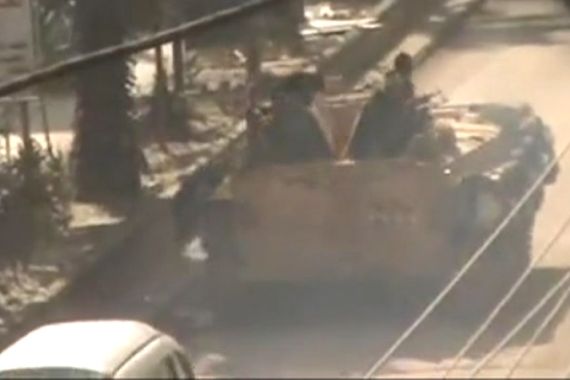Syrian army in offensive near Damascus
Activists report tanks on the streets and clashes between Syrian soldiers and deserters in restive suburb of Al-Ghouta.

The Syrian military has launched an offensive to regain control of suburbs on the eastern edge of Damascus, storming neighbourhoods and clashing with groups of army deserters in fighting that sent residents fleeing and killed at least three civilians, activists said.
Six soldiers were also killed when a roadside bomb detonated near the bus they were travelling in south of the capital.
The escalation in violence on Sunday came a day after the Arab League suspended its observer mission in the country.
Activists inside Damascus told Al Jazeera’s Anita McNaught that tanks had rolled into Al-Ghouta, within 10km of the city centre.
“People we’ve spoken to are too frightened to leave their homes, they’ve locked themselves in,” our correspondent said from Istanbul in neighbouring Turkey.
Al-Ghouta is historically known for being a hub of dissent against the government of Syrian President Bashar al-Assad, and the crackdown appeared to be an attempt “to avoid any Tahrir Square-style mass movements”, she said.
Activists said there were 64 people killed in fighting across the country on Sunday, including three children and two defected recruits, according to the Local Co-ordination Committees (LCC), an activist network. In the suburbs of Damascus, there were 16 deaths, in Kafar Batna, Saqba, Hamourya, Rankoos, Zabadany and Harasta.
Some 19 were killed in Homs, 15 in Hama, five in Idlib, four in Deraa and three in Saraqeb, Deir Ezzor and Damascus, the LCC said.
Amateur video appeared to show tanks rolling in to Al-Ghouta and Zamalka to the east.
There were also unconfirmed reports that the shelling had destroyed homes with people inside.
In the southern province of Deraa, there were reports that security forces had killed two students when they broke into a school in the town of Jasim.
Russia condemns Arab League
Russia has strongly criticised the Arab League decision to halt its observer mission in Syria amid the escalating violence, saying the situation demands additional deployment of monitors and not their suspension.
|
Al Jazeera’s Anita McNaught reports on the situation in Syria from Istanbul, in neighbouring Turkey
|
“We would like to know why they are treating such a useful instrument in this way,” Sergei Lavrov, the Russian foreign minister, said during a visit to Brunei on Sunday.
“I would support an increased number of observers,” Lavrov said. “We are surprised that after a decision was taken on prolonging the observers’ mission for another month, some countries, particularly Persian Gulf countries, recalled their observers from the mission.”
The Arab League suspended its observer mission on Saturday as the bloodshed in a crackdown on anti-government protests spiked. Several hundred people have died in the past four days alone.
Lavrov said that he did not back those Western countries that said the mission was pointless and that it was impossible to hold dialogue with Assad’s government.
“I think these are very irresponsible statements because trying to sabotage a chance to calm the situation is absolutely unforgivable,” he said.
Syrian resentment
Syria also voiced its dismay and surprise over the Arab League decision to halt its observer mission.
“Syria regrets and is surprised at the Arab decision to stop the work of its monitoring mission after it asked for a one- month extension of its work,” Syria Television reported on Saturday.
“This will have a negative impact and put pressure on [Security Council] deliberations with the aim of calling for foreign intervention and encouraging armed groups to increase violence,” it said.
Nabil Elaraby, the Arab League chief, travelled to New York on Sunday seeking to win support from the UN Security Council for a plan to end violence in Syria by asking Assad to step aside.
Elaraby, the league’s secretary-general, will be joined in New York by Sheikh Hamad bin Jassim Al Thani, the Qatari prime minister whose country heads the bloc’s committee charged with following Syrian developments. Qatar and fellow Gulf Arab state Saudi Arabia have been leading efforts to put pressure on Assad.
“We will hold several meetings with representatives from members of the Security Council to obtain the council’s support and agreement to the Arab initiative,” Elaraby told reporters at Cairo airport shortly before leaving for New York.
The bloc said around 100 observers would remain in the country but would not undertake new missions.
The mission has been widely criticised by the Syrian opposition for failing to end the government’s crackdown on protests.
Kurd conference
Meanwhile, more than 200 Syrian Kurds from 25 countries are taking part in a two-day conference in the Iraqi Kurdish regional capital of Irbil, with their leaders saying they would want a referendum after the eventual fall of Assad to decide on their people’s future as part of Syria.
“In Syria, we will not obtain the same thing as the Iraqi Kurds because the circumstances are different,” Hamid Darwish, head of the Kurdish Democratic Progressive Party of Syria, said.
“We want our national rights to be written into the constitution and approved by our Arab brothers,” he said.
Abdul-Hakim Bashar, who leads the Kurdish Democratic Party in Syria, said his people had “the right to self-determination within the framework of the unity of Syria and based on the principle of decentralisation”.
Kurds account for about nine per cent of Syria’s population. They have several rival parties, all of which are officially banned, seeking political and administrative rights for their community.